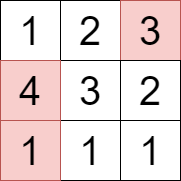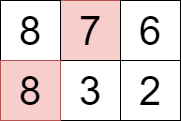| comments | difficulty | edit_url | rating | source | tags | |||||
|---|---|---|---|---|---|---|---|---|---|---|
true |
Hard |
2402 |
Weekly Contest 413 Q3 |
|
You are given a 2D matrix grid consisting of positive integers.
You have to select one or more cells from the matrix such that the following conditions are satisfied:
- No two selected cells are in the same row of the matrix.
- The values in the set of selected cells are unique.
Your score will be the sum of the values of the selected cells.
Return the maximum score you can achieve.
Example 1:
Input: grid = [[1,2,3],[4,3,2],[1,1,1]]
Output: 8
Explanation:
We can select the cells with values 1, 3, and 4 that are colored above.
Example 2:
Input: grid = [[8,7,6],[8,3,2]]
Output: 15
Explanation:
We can select the cells with values 7 and 8 that are colored above.
Constraints:
1 <= grid.length, grid[i].length <= 101 <= grid[i][j] <= 100
We define
First, we preprocess the matrix using a hash table
For the state
Finally, we return
The time complexity is
class Solution:
def maxScore(self, grid: List[List[int]]) -> int:
g = defaultdict(set)
mx = 0
for i, row in enumerate(grid):
for x in row:
g[x].add(i)
mx = max(mx, x)
m = len(grid)
f = [[0] * (1 << m) for _ in range(mx + 1)]
for i in range(1, mx + 1):
for j in range(1 << m):
f[i][j] = f[i - 1][j]
for k in g[i]:
if j >> k & 1:
f[i][j] = max(f[i][j], f[i - 1][j ^ 1 << k] + i)
return f[-1][-1]class Solution {
public int maxScore(List<List<Integer>> grid) {
int m = grid.size();
int mx = 0;
boolean[][] g = new boolean[101][m + 1];
for (int i = 0; i < m; ++i) {
for (int x : grid.get(i)) {
g[x][i] = true;
mx = Math.max(mx, x);
}
}
int[][] f = new int[mx + 1][1 << m];
for (int i = 1; i <= mx; ++i) {
for (int j = 0; j < 1 << m; ++j) {
f[i][j] = f[i - 1][j];
for (int k = 0; k < m; ++k) {
if (g[i][k] && (j >> k & 1) == 1) {
f[i][j] = Math.max(f[i][j], f[i - 1][j ^ 1 << k] + i);
}
}
}
}
return f[mx][(1 << m) - 1];
}
}class Solution {
public:
int maxScore(vector<vector<int>>& grid) {
int m = grid.size();
int mx = 0;
bool g[101][11]{};
for (int i = 0; i < m; ++i) {
for (int x : grid[i]) {
g[x][i] = true;
mx = max(mx, x);
}
}
int f[mx + 1][1 << m];
memset(f, 0, sizeof(f));
for (int i = 1; i <= mx; ++i) {
for (int j = 0; j < 1 << m; ++j) {
f[i][j] = f[i - 1][j];
for (int k = 0; k < m; ++k) {
if (g[i][k] && (j >> k & 1) == 1) {
f[i][j] = max(f[i][j], f[i - 1][j ^ 1 << k] + i);
}
}
}
}
return f[mx][(1 << m) - 1];
}
};func maxScore(grid [][]int) int {
m := len(grid)
mx := 0
g := [101][11]bool{}
for i, row := range grid {
for _, x := range row {
g[x][i] = true
mx = max(mx, x)
}
}
f := make([][]int, mx+1)
for i := range f {
f[i] = make([]int, 1<<m)
}
for i := 1; i <= mx; i++ {
for j := 0; j < 1<<m; j++ {
f[i][j] = f[i-1][j]
for k := 0; k < m; k++ {
if g[i][k] && (j>>k&1) == 1 {
f[i][j] = max(f[i][j], f[i-1][j^1<<k]+i)
}
}
}
}
return f[mx][1<<m-1]
}function maxScore(grid: number[][]): number {
const m = grid.length;
let mx = 0;
const g: boolean[][] = Array.from({ length: 101 }, () => Array(m + 1).fill(false));
for (let i = 0; i < m; ++i) {
for (const x of grid[i]) {
g[x][i] = true;
mx = Math.max(mx, x);
}
}
const f: number[][] = Array.from({ length: mx + 1 }, () => Array(1 << m).fill(0));
for (let i = 1; i <= mx; ++i) {
for (let j = 0; j < 1 << m; ++j) {
f[i][j] = f[i - 1][j];
for (let k = 0; k < m; ++k) {
if (g[i][k] && ((j >> k) & 1) === 1) {
f[i][j] = Math.max(f[i][j], f[i - 1][j ^ (1 << k)] + i);
}
}
}
}
return f[mx][(1 << m) - 1];
}
